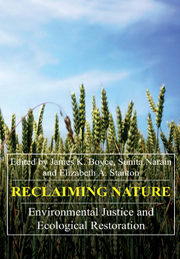Book contents
- Frontmatter
- Contents
- List of Figures and Tables
- Acknowledgements
- Introduction
- Part I ADDING VALUE
- Part II DEMOCRATIZING ACCESS
- Part III CAPTURING BENEFITS
- Part IV DEFENDING THE COMMONS
- 13 International Environmental Justice: Building the Natural Assets of the World's Poor
- 14 Environmental Justice: Reflections from the United States
- 15 Equitable Carbon Revenue Distribution under an International Emissions Trading Regime
- 16 Greenhouse Justice: An Entitlement Framework for Managing the Global Atmospheric Commons
- About the Contributors
- Index
15 - Equitable Carbon Revenue Distribution under an International Emissions Trading Regime
from Part IV - DEFENDING THE COMMONS
Published online by Cambridge University Press: 05 March 2012
- Frontmatter
- Contents
- List of Figures and Tables
- Acknowledgements
- Introduction
- Part I ADDING VALUE
- Part II DEMOCRATIZING ACCESS
- Part III CAPTURING BENEFITS
- Part IV DEFENDING THE COMMONS
- 13 International Environmental Justice: Building the Natural Assets of the World's Poor
- 14 Environmental Justice: Reflections from the United States
- 15 Equitable Carbon Revenue Distribution under an International Emissions Trading Regime
- 16 Greenhouse Justice: An Entitlement Framework for Managing the Global Atmospheric Commons
- About the Contributors
- Index
Summary
Introduction
Scientists believe with high certainty that the impacts of current greenhouse gas emissions have started but may not be completely felt for 100 years or more. The long-term nature of the climate problem requires fundamental, long-term changes in how economies produce goods and services. One of the most likely policies to encourage the transition to reduced use of fossilfuel energy is a system of overlapping national and international emissions permits (Victor et al. 2005; Hultman 2004). The Kyoto Protocol set up one international trading system, but even if this Protocol ultimately fails, the movement towards a global emissions market is likely to continue for several reasons. First, most major polluting countries have endorsed the aims and the mechanisms of Kyoto. Second, the European Union has already implemented a broad coverage emissions-trading system parallel to Kyoto's. Third, many large industrial and energy corporations — including the major European energy oil companies — have endorsed the mechanisms of the Kyoto Protocol, and some have initiated their own emissions trading systems.
The world therefore is likely see the emergence of multiple linked markets for greenhouse gas emissions permits over the next five to ten years. These systems, implemented soundly, should help reduce humanity's impact on the global climate by internalizing some of the costs of climate change. At the same time, these permits will be assets that have an economic value and provide economic benefits.
- Type
- Chapter
- Information
- Reclaiming NatureEnvironmental Justice and Ecological Restoration, pp. 379 - 400Publisher: Anthem PressPrint publication year: 2007
- 2
- Cited by

